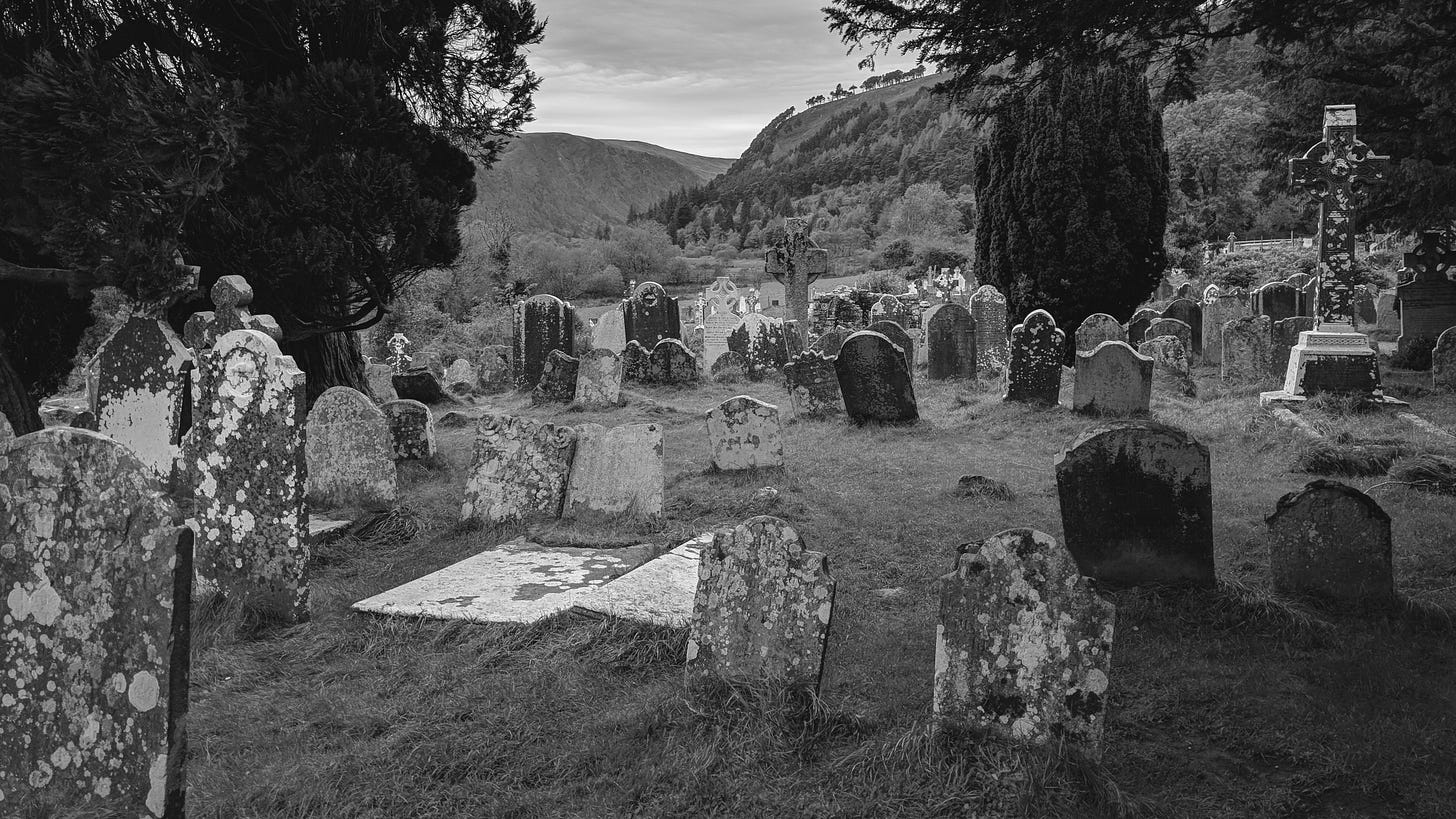I. Death
Let’s begin with death, before returning to life for our conclusion. For some people this might be the equivalent of getting the bad news out of the way first. So: have you noticed the prevalence of linguistic allusions to death? Do you consider it peculiar? Or is it reasonable because every story does, eventually, have the same ending? In just the last week, consider how writers at The New York Times have alluded to death, even when the subject is more prosaic:
When discussing politics, “…the domestic agenda was moribund.”
When reviewing a film, “…feel a little mortifying.”
When featuring a person with A.L.S., “…a morbid curiosity.”
And, twice, when describing an airplane’s middle seat, “…I am squished…entombed, immured.”
The Latin root mori appears to have burrowed deep into our language, shaping our speech regardless of how close we are to the cemetery. Once you start looking for examples, you’ll find them scattered throughout morning breakfast chats and overheard public conversations, endlessly reminding you of the eternal. Of course most people aren’t aware of these connections when they speak, but that’s what I find especially interesting. Phrases and chunks of language—filled with meaning, constructed from clear roots—emerge in conversation as reflexes, easily, automatically, without forethought.
Through the Italian morire (to die) we get a long list: mortal, immortal, mortality, immortality, mortuary, morgue, postmortem, moribund, amortize, mortify, mortician, immure. But you’ll discover after you start listening that death infuses the language. We use it to describe inanimate objects and processes. It creates our metaphors and our expressions although we rarely, perhaps thankfully, stop to think about how startling it is to constantly reference the grave: dead battery, dead wood, dead air, dead letter, dead zone, dead calm, dead loss, dead center, dead time, dead heat, dead-end job, dead stock, deadlock.
Now those expressions—which clearly have die as a root—come to our contemporary speech through a different path. With die we have the rare example of one Old Norse word replacing two Old English words (steorfan and sweltan) and persisting into Modern English. And the word die has been remarkably stable in the language, maintaining roughly the same form, with the same conjugation—die, died, dying—for centuries.
Having a word remain stable for such a long period means, almost certainly, that people use it often. Words often solidify in one form once they’re part of everyday conversations or written in texts, even though the wider language might be evolving. That’s why the most commonplace verbs, such as swim or run or sleep, often have irregular conjugations. The child who says I swimmed or I runned or I sleeped has, in fact, inculcated the past tense pattern for English. They’ve just applied our contemporary grammar onto verbs that still maintain an older form—because those verbs have been used too often to evolve with the language.
One horrific aside is that the Modern English verb to die appears to have replaced the Old English word steorfan during the Middle English period—although steorfan remains in the language as the word starve. And if you spend just a moment contemplating this history, you’ll shudder from the awareness that the word starve was basically the word for death, which gives you a picture of the period that’s all too vivid—with vivid, incidentally, a word that we’ll come back to when we’re focused on life in part II.
If you’re curious about linguistics and you’re investigating English, at this point, there’s a question that’s logical: what’s the second word for death? Whenever you’re exploring an English term that’s fundamental always search for the second word that expresses the same concept—as there’s often a French root that gives a formal or official layer to the language as a result of the Norman Conquest. Instead of keeping one word when two languages meet, English, unusually, often keeps both, so that we have the English freedom and the French liberty, the English fire and the French flame, the English before and the French prior—along with countless other examples. We saw this already with the root mori- and its contemporary descendants. For our subject we have the Old Norse die and the Old French decease. You don’t say, “he deceased yesterday,” but you do say, in a courtroom, “I approached the deceased,” simply because we reserve those French words for our formal speech, still to this day.
And if you look to literature, death is certainly omnipresent, both literally and metaphorically, as it is our most fundamental subject and always ripe for exploration. “Out, out, brief candle!” is one of the famed lines in Macbeth; it’s clear enough, but the few words that come before make sure you get the point: “The way to dusty death.”
Although that expresses despair—a despair about murder, really—there are also plenty of famed lines in literature about metaphoric deaths, about the ways you can experience the sensation of death during your life. In a different play, Shakespeare has Julius Caesar make this very point:
Cowards die many times before their deaths; /
The valiant never taste of death but once. /
Of all the wonders that I yet have heard, /
It seems to me most strange that men should fear, /
Seeing that death, a necessary end, /
Will come when it will come.
— Julius Caesar, Act 2, scene 2
In a line that impressively manages to appear in both poetry seminars and popular culture, Dylan Thomas’ “Do not go gentle into that good night. / Rage, rage against the dying of the light” provides some emotive thrust against the inevitable. Plus there’s something romantic about maintaining a little stubbornness and fortitude and defiance even when the battle is guaranteed to be lost. Life is, alas, on this subject, rather predictable.
II. Life
Perhaps there’s something uplifting in the fact that The New York Times, at least in recent days, used to live as the root for many descriptions:
When discussing politics, “…to control the vital shipping route.”
When reviewing a restaurant, “…window-filled dining room is vivacious.”
When covering travel, “…at Doi Ka Noi, a convivial restaurant…”
When writing about Hong Kong, “…and to revitalize tourism.”
Keep reading with a 7-day free trial
Subscribe to Desk Notes by Charles Schifano to keep reading this post and get 7 days of free access to the full post archives.




